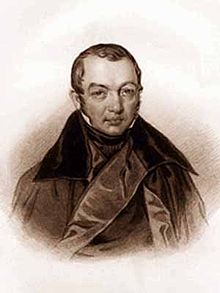Faddei Wenediktowitsch Bulgarin
Tadeusz Bulharyn in Russia known as Faddey Bulgarin ( Russian Фаддей Венедиктович Булгарин * June 24 . Jul / 5. July 1789 greg. In Peryschewo at USDA , Poland-Lithuania , † September 1 jul. / 13. September 1859 greg . in Karlova near Tartu ) was a Russian author and literary critic.
Life
Bulgarin was born into a Polish noble family near Minsk in what is now Belarus . His father, a supporter of Kosciuszko , was exiled to Siberia for an attack on a Russian general . Bulgarin was trained in a St. Petersburg military academy and took part in the Battle of Friedland , but was interned a little later for theft. While his regiment was stationed in Finland , Bulgarin deserted to Warsaw , where he joined the Grande Armée . He fought under the Napoleonic flag in the Napoleonic wars on the Iberian Peninsula and in Napoleon's Russian campaign of 1812. In 1814, Bulgarin was captured in France and transferred to Prussia . From here on there is a 6-year gap in his biography.
In 1820 Bulgarin traveled from Warsaw to St. Petersburg, where he published a critical overview of Polish literature, and in 1823 began editing the Nordic Archives . He made friends with the playwright Alexander Gribojedow and the philologist Nicholai Gretsch . The latter supported him in the publication of the newspaper Die Nordbiene ( Северная пчела , 1825-39), the literary magazine Syn otetschestwa (1825-59), a political daily, which the government granted the singular right to discuss political news, and others reactionary periodicals.
It was no secret that Bulgarin and Gretsch were paid agents of the Tsarist police and used their magazines to spread government propaganda on behalf of the government. Bulgarin's unscrupulous behavior made him one of Russia's most hated journalists. Alexander Pushkin in particular made fun of him in a large number of epigrams , for example by changing his name to Figljarin (derived from the Russian word for "clown"). Bulgarin returned with epigrams in which he changed Pushkin's name to Tschuschkin (from Russian Tschusch for "nonsense").
Inspired by Sir Walter Scott , Bulgarin wrote a number of historical novels about "Iwan Wyshigin", which were popular both in Russia and abroad. This was followed by two moralizing novels about the pseudodimitri (1830) and Iwan Masepa (1834). In 1837 he published an extensive description of Imperial Russia under his own name, which was in fact the work of Professor Nikolai Ivanov of the University of Dorpat .
Some of Bulgarin's stories are science fiction : Believable Lies is a distant future story about the 24th century; Impossible Lies is a fantastic journey into the interior of the earth Mitrofanushka's adventure on the moon is a satire.
After the death of Tsar Nicholas I , Bulgarin retired after many years from his posts in the horse breeding department and lived in his Karlova estate near Tartu.
Web links
- Literature by and about Faddei Wenediktowitsch Bulgarin in the catalog of the German National Library
- Entry in the FEB (Russian)
| personal data | |
|---|---|
| SURNAME | Bulgarin, Faddei Wenediktowitsch |
| ALTERNATIVE NAMES | Tadeusz Bulharyn |
| BRIEF DESCRIPTION | Polish-Russian author |
| DATE OF BIRTH | July 5, 1789 |
| PLACE OF BIRTH | Peryshevo near Usda |
| DATE OF DEATH | September 13, 1859 |
| Place of death | Karlova (Estonia) near Tartu |
